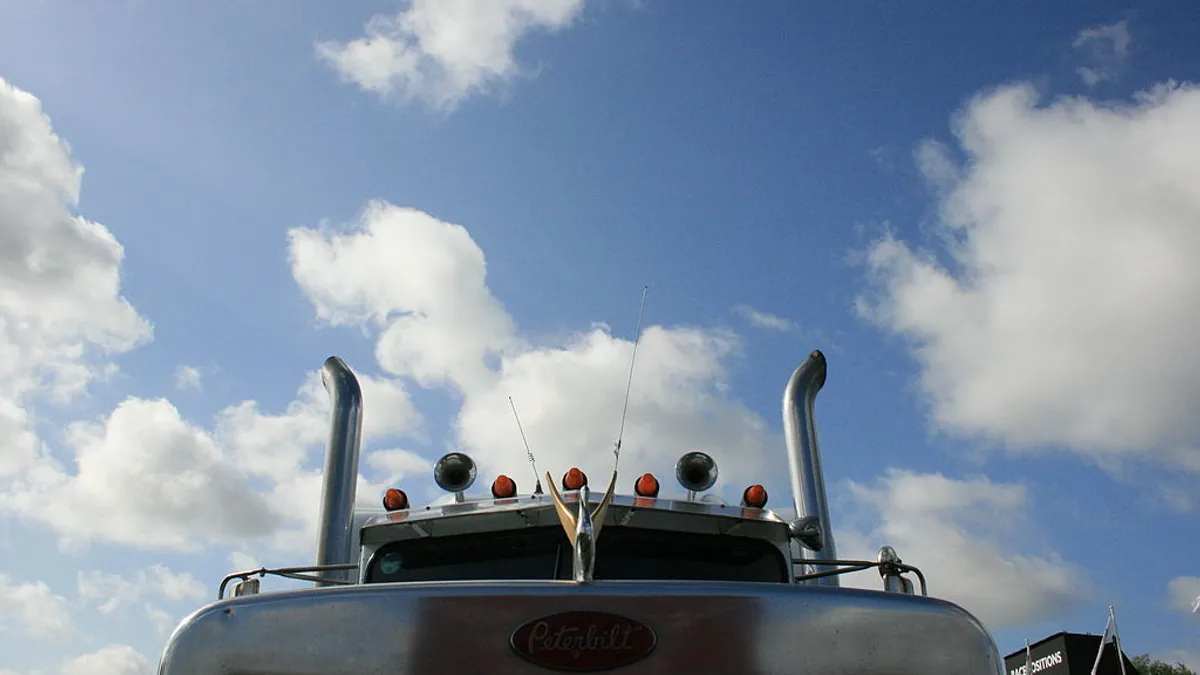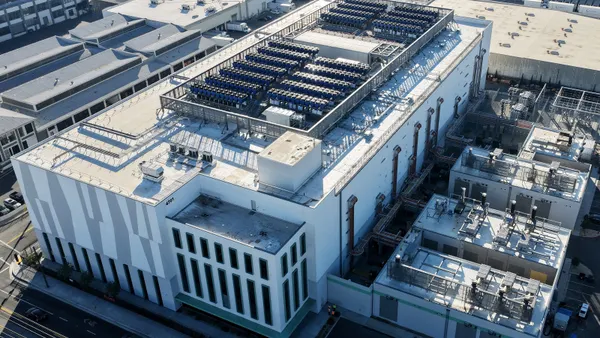Dive Brief:
- Governors from 15 states and the mayor of Washington, D.C., signed a memorandum of understanding (MoU) to ensure 100% of medium- and heavy-duty sales are zero-emissions vehicles (ZEV) by 2050, according to a Northeast States for Coordinated Air Use Management (NESCAUM) press release. The group has an interim target of 30% electric vehicle (EV) sales by 2030.
- The participants will work through NESCAUM's Multi-State ZEV Task Force, created in 2013. The task force's latest action plan, released in 2018, focused on light-duty passenger vehicles. Under the MoU, the group will develop and implement a plan for trucks and buses.
- Thirty-seven businesses, including DHL, Ikea, Pepsi and Unilever, signed a letter in support of the MoU. "Electrification of many commercial vehicle applications still face significant challenges around higher upfront costs, range, weight, charging time, and infrastructure deployment. A coordinated multi-state approach to implementation of market-enabling initiatives is required," the letter reads.
Participating locations:
| California | New Jersey |
| Colorado | New York |
| Connecticut | North Carolina |
| Washington, D.C. | Oregon |
| Hawaii | Pennsylvania |
| Maine | Rhode Island |
| Maryland | Washington |
| Massachusetts | Vermont |
Dive Insight:
The MoU represents the "largest multi-state action on clean transportation in U.S. history," according to a press release from nonprofit Ceres, which leads the Corporate Electric Vehicle Alliance that was formed in January. Cosignatories to the letter supporting the MoU said a multi-state approach "is required" given the "significant challenges around higher upfront costs, range, weight, charging time, and infrastructure deployment" for commercial EVs.
The MoU follows the California Air Resources Board's (CARB) rule for EV sales, passed late last month. Though the memorandum doesn't mandate policy, NESCAUM Executive Director Paul Miller told Transport Dive it gives states the opportunity to follow in the Golden State's footsteps.
"We all recognize we're in tough economic times. And at the same time, I think, collectively, we want to come out of this ... stronger than the way we came in," Miller told Transport Dive in an interview. "And things like getting off petroleum where we can not only helps the resiliency of the industry, it also serves our state's goals of addressing climate and public health issues."
According to the Department of Energy, switching from using solely petroleum to using a variety of alterative fuels can make the industry "more resilient to natural disasters by improving the redundancy of its supply, increasing local storage, strategizing access to that storage, expediting resupply, and improving the efficiency at which that fuel is used for transportation purposes." Natural gas, propane and electricity all come from different sources, increasing redundancy.
Participating jurisdictions will develop an action plan within six months to identify barriers and propose solutions to reach the goals, according to the MoU. They'll consider financial and non-financial vehicle and infrastructure incentives, funding models, coordinated outreach and education for fleet managers, utilities needed for a charging infrastructure, measures to encourage use of electric trucks in densely populated areas, weight restrictions that are barriers to EV deployment, and standards and data collection requirements, among other areas.
"To lead by example, each Signatory State will progress toward electrification of its government and quasi-governmental agency fleets and explore opportunities for coordinated/aggregated vehicle and infrastructure procurement," the MoU states. Jurisdictions will also work with truck OEMs, utilities, advocates and fleet owners to further the memorandum's goals.
California's rule requires truck OEMs to sell an increasing percentage of zero-emission trucks in California between 2024 and 2035. And by 2045, the board said, every new truck sold in California would be a ZEV. The rule also includes a one-time reporting requirement for large employers, regarding their facilities, types of truck services and fleet.
Despite the challenges phasing out diesel presents fleets, such as uncertainties about dependability and maintenance costs, many companies have emissions goals in their environmental, social and governance commitments, Nikola Motor President Mark Russell told Transport Dive in May. "[Fleets] have already made the decision to pivot away from fossil fuels, now and forever," he said.
According to NESCAUM, the total cost of ownership for many common commercial vehicles is projected to reach parity with conventionally fueled vehicles by 2030.
Some companies cite the pandemic as a contributor to the gravity of the need to adopt greener standards. The letter to governors mentions there is "ever more urgency as businesses navigate a shifting economy and business model in the wake of COVID-19." Multiple executives have told Transport Dive that the decreased manufacturing and automobile activity around the world driven by the pandemic have showed the public that it's possible to cut pollution and added to the momentum.














